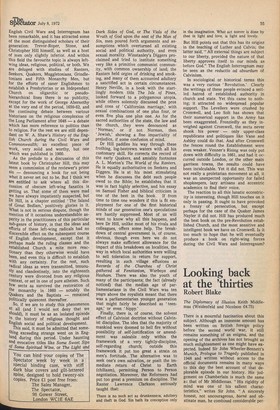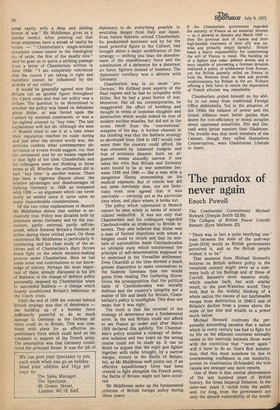Looking back at the 'thirties
Robert Blake
The Diplomacy of Illusion Keith Middlemas (Weidenfeld and Nicolson £4.75) There is a mournful fascination about this subject. Although an immense amount has been written on British foreign policy before the second world war, it still remains something of an enigma, and the opening of the archives has not brought as much enlightenment as one might have expected. Indeed Sir John Wheeler-Bennett's Munich, Prologue to Tragedy published in 1948 and written without access to the official documents remains in many ways to this day the best account of that deplorable episode in our history. His judgement on Chamberlain is much the same a; that of Mr Middlemas. "His rigidity of mind was one of his salient characteristics," writes Sir John. " A sincerely honest, not uncourageous, born 4 and obstinate man, he combined considerable per sonal vanity with a deep and abiding horror of war." Mr Middlemas gives us a similar verdict. After pointing out that most statesmen have a streak of vanity he writes — "Chamberlain's single-minded assurance comes nearer to the theological sin of pride, the first of the deadly sins." And he goes on to quote a striking passage from a letter of Chamberlain written in June 1938: "I am completely convinced that the course I am taking is right and therefore cannot be influenced by the attacks of my critics."
It would be generally agreed now that Britain cut an ignoble figure throughout the Czech crisis and that her policy was a .failure. The question to be determined is whether the policy was based on delusions about Hitler, or was forced upon the Cabinet by external constraints, or was a far-sighted attempt to 'buy time.' The last explanation will not do. Although the men of Munich tried to use it at a time when their reputation reached its nadir during and just after the second world war, the archives confirm what contemporary observation of events would suggest, viz, that the settlement was by no means regarded i that light at the time. Chamberlain and his colleagues were not thinking in those terms at all. Whether the settlement did in fact 'buy time' is another matter. There has been a vigorous dispute about the relative advantages and disadvantages of fighting Germany in 1938 as compared with 1939 — an argument which can never really be settled since it turns upon so many imponderable considerations.
Of the two other explanations of Munich Mr Middlemas shows that neither is exclusively true. Policy was dictated both by delusions about Germany and by the constraints, partly external, partly self-imposed, which fettered Britain's freedom of action during those critical years. On these constraints Mr Middlemas is particularly illuminating, and his close study of the archives and of Chamberlain's diary throws much light on the whole decision-making process under Chamberlain. Here he has made some real contributions to our knowledge of history. Perhaps the most important of these, already discussed in his life of Baldwin, is the change of defence policy personally imposed by Chamberlain when he succeeded Baldwin — a change which largely conditioned Britain's behaviour in the Czech crisis.
Until the end of 1936 the concept behind British strategy was that of deterrence — the building up of a bomber force sufficiently powerful to do as much damage to Germany as the German air force could do to Britain. This was combined with plans for an effective expeditionary force which could land on the continent in support of the French army. The assumption was that Germany constituted the principal threat. It was the job of diplomacy to do everything possible to neutralise danger from Italy and Japan. Even before Baldwin retired Chamberlain, his predestined successor and by far the most powerful figure in the Cabinet, had brought about a major modification of this strategy — nothing less than the abandonment of the expeditionary force and the substitution of a defensive for a deterrent air force, fighters instead of bombers. The diplomatic corollary was a détente with Germany.
Chamberlain was in no sense 'proGerman.' He disliked most aspects of the Nazi regime and he had no sympathy with Hitler. But he had a great horror of war. Moreover, like all his contemporaries, he exaggerated the effect of bombing and thought in terms of immense slaughter and destruction which would indeed be true of modern nuclear missiles, but did not in the event result from the 'conventional' weapons of his day. A further element in his thinking was that the Baldwin strategy as developed from 1934 to 1937 would cost more than the country could afford. He was obsessed by balanced budgets and fear of economic disaster. Such an argument seems absurdly narrow if one takes the view that Britain and Germany were bound to be at war sometime between 1938 and 1940 — like a man with a dangerous illness economising on his medical expenses. But of course war did not seem inevitable then, nor are historians even now agreed that it was inevitable — certainly not at the particular time when, and place where, it broke out.
The policy which culminated in Munich cannot be seen solely in terms of miscalculated realpolitih. It was not only that Chamberlain and his colleagues regarded Czechoslovakia as irrelevant to British interests. They also believed that Hitler was a man of limited objectives with whom a bargain could be struck and that its mixture of nationalities made Czechoslovakia an unviable state which contravened the principle of self-determination supposed to be enshrined in the Versailles settlement. Even Churchill at the time showed a much greater disposition to make concessions to the Sudeten Germans than one would guess from reading The Gathering Storm. Given the presupposition that the political basis of Czechoslovakia was morally dubious and the country's integrity not a matter of life and death for Britain, Chamberlain's policy is intelligible. This does not mean that it was right.
The truth is that the reversal of the strategy of deterrence was a fundamental error. In the end Britain could not afford to see France go under and after March 1939 declared this publicly. Yet Chamberlain's policy entailed a strategy of defensive isolation and two years on the wrong course could not be made up. It can no doubt be argued that the eight gun fighter together with radar brought, by a narrow margin, victory in the Battle of Britain, but, as Mr Middlemas well points out, if an effective expeditionary force had been created to fight alongside the French army, the Battle of Britain might not have occurred.
Mr Middlemas sums up the fundamental criticism of British foreign policy during these years:
If the Chamberlain government regarded the security of France as an essential interest — as it showed in January and March 1939 — then the previous lack of liaison and their high-handed treatment of their ally was unwise and probably deeply harmful. Britain bears a heavy responsibility for undermining the will of France to resist. The building up of a fighter and radar defence screen and a navy capable of preventing a German invasion indicated a policy of withdrawal from Europe, yet the British patently relied on France to hold the Western front on land and provide reinforcements for Britain in the air. Without offering a field force in return the expectation of French altruism was remarkable.
Chamberlain prided himself on his ability to cut away from traditional Foreign Office shibboleths. Yet in the situation of the 1930s the balance of power and the Grand Alliance were better guides than desire for cost-efficiency or moral scruples about oppressed minorities. Pitt and Disraeli were better mentors than Gladstone. The trouble was that most members of the Cabinet, though they called themselves Conservatives, were Gladstonian Liberals at heart.











































 Previous page
Previous page